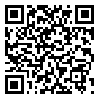Volume 13, Issue 4 (July & August: Special Issue on Cognitive Sciences 2022)
BCN 2022, 13(4): 477-488 |
Back to browse issues page
Download citation:
BibTeX | RIS | EndNote | Medlars | ProCite | Reference Manager | RefWorks
Send citation to:



BibTeX | RIS | EndNote | Medlars | ProCite | Reference Manager | RefWorks
Send citation to:
Roozrokh Arshadi Montazer M, Zahediannasab R, Nami M, Tahamtan M, Sharifian R, Nasiri M. Psychometric Evaluation of Self-assessment Persian Version of the Alzheimer Questionnaire (AQ). BCN 2022; 13 (4) :477-488
URL: http://bcn.iums.ac.ir/article-1-1663-en.html
URL: http://bcn.iums.ac.ir/article-1-1663-en.html
Mahsa Roozrokh Arshadi Montazer1 

 , Roohollah Zahediannasab2
, Roohollah Zahediannasab2 

 , Mohammad Nami2
, Mohammad Nami2 

 , Mahshid Tahamtan2
, Mahshid Tahamtan2 

 , Roxana Sharifian *1
, Roxana Sharifian *1 

 , Mahdi Nasiri3
, Mahdi Nasiri3 



 , Roohollah Zahediannasab2
, Roohollah Zahediannasab2 

 , Mohammad Nami2
, Mohammad Nami2 

 , Mahshid Tahamtan2
, Mahshid Tahamtan2 

 , Roxana Sharifian *1
, Roxana Sharifian *1 

 , Mahdi Nasiri3
, Mahdi Nasiri3 

1- Department of Health Information Health Management, School of Management & Information Sciences, Shiraz University of Medical Sciences, Shiraz, Iran.
2- Neuroscience Laboratory (Brain, Cognition, and Behavior), Department of Neuroscience, School of Advanced Medical Sciences and Technologies, Shiraz University of Medical Sciences, Shiraz, Iran.
3- Health Human Resources Research Center, School of Health Management & Information Sciences, Shiraz University of Medical Sciences, Shiraz, Iran.
2- Neuroscience Laboratory (Brain, Cognition, and Behavior), Department of Neuroscience, School of Advanced Medical Sciences and Technologies, Shiraz University of Medical Sciences, Shiraz, Iran.
3- Health Human Resources Research Center, School of Health Management & Information Sciences, Shiraz University of Medical Sciences, Shiraz, Iran.
Abstract:
Introduction: Mild cognitive impairment (MCI) is a primary disorder intensified by aging. Rapid diagnosis of MCI can prevent its progression towards the development of dementia. Thus, the present study was conducted to evaluate the psychometric features of the self-assessment Persian version of the Alzheimer questionnaire (AQ) in the elderly to detect MCI.
Methods: First, the AQ was translated into the Persian language; then, its content validity was evaluated by the content validity index (CVI) and content validity ratio (CVR) method, and face validity was determined by two checklists for expert panel and the elderly. The convergent validity of the self-assessment AQ with the Montreal cognitive assessment (MoCA) was assessed using the Pearson correlation. The test-retest and internal consistency reliability were evaluated using intra-class correlation (ICC) and Kuder-Richardson coefficients, respectively. Moreover, the receiver operating characteristic curve was used to determine the optimal cut-off point of self-assessment AQ. Among 148 older people who took part in this study, 93 met our inclusion criteria (aged 60 years old or older, had reading and writing skills, and were able to speak and communicate).
Results: A translated version of the questionnaire was named “M-check.” The developed test showed good content and face validity. Statistically significant correlations were found between M-check and MoCA (r=-0.83, P<0.05). The Kuder–Richardson and ICC coefficients were obtained as 0.84 and 0.92, respectively. Area under the curve presented satisfactory values (Area under curve [AUC]=0.852, sensitivity=0.62, specificity=0.94).
Conclusion: The M-check can be used as a valid and reliable instrument for assessing cognitive state and screening MCI in older adults.
Methods: First, the AQ was translated into the Persian language; then, its content validity was evaluated by the content validity index (CVI) and content validity ratio (CVR) method, and face validity was determined by two checklists for expert panel and the elderly. The convergent validity of the self-assessment AQ with the Montreal cognitive assessment (MoCA) was assessed using the Pearson correlation. The test-retest and internal consistency reliability were evaluated using intra-class correlation (ICC) and Kuder-Richardson coefficients, respectively. Moreover, the receiver operating characteristic curve was used to determine the optimal cut-off point of self-assessment AQ. Among 148 older people who took part in this study, 93 met our inclusion criteria (aged 60 years old or older, had reading and writing skills, and were able to speak and communicate).
Results: A translated version of the questionnaire was named “M-check.” The developed test showed good content and face validity. Statistically significant correlations were found between M-check and MoCA (r=-0.83, P<0.05). The Kuder–Richardson and ICC coefficients were obtained as 0.84 and 0.92, respectively. Area under the curve presented satisfactory values (Area under curve [AUC]=0.852, sensitivity=0.62, specificity=0.94).
Conclusion: The M-check can be used as a valid and reliable instrument for assessing cognitive state and screening MCI in older adults.
Type of Study: Original |
Subject:
Cognitive Neuroscience
Received: 2019/11/28 | Accepted: 2020/07/12 | Published: 2018/03/15
Received: 2019/11/28 | Accepted: 2020/07/12 | Published: 2018/03/15
Send email to the article author
| Rights and permissions | |
 |
This work is licensed under a Creative Commons Attribution-NonCommercial 4.0 International License. |





